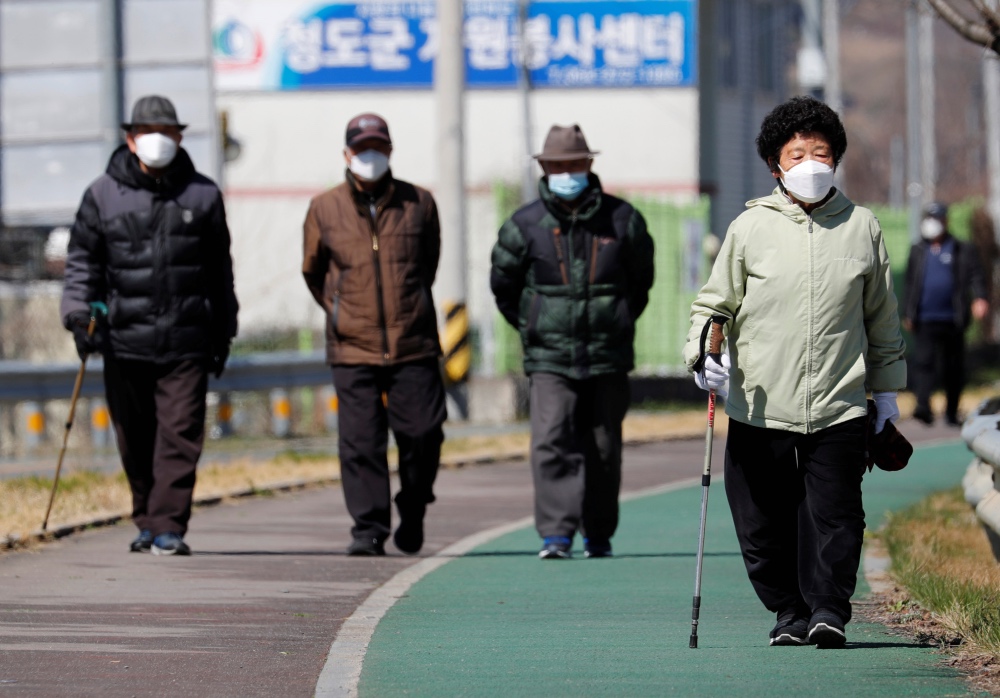Geneva, Switzerland/London, UK
Reuters
The World Health Organization described the coronavirus outbreak as a pandemic for the first time on Wednesday as Italy tightened its lockdown, shutting bars, hairdressers and other non-essential businesses.
The virus sent the Dow into a bear market for the first time since the 2008 financial crisis as the massive financial stimulus promised by governments around the globe failed to reassure investors.
The United States has yet to enact any large-scale containment measures as cases topped 1,000 as testing became more available, including the nation’s first drive-through testing in Denver – a measure that proved key to containment in South Korea.
“Bottom line, it’s going to get worse,” Anthony Fauci, head of the US National Institute of Allergy and Infectious Diseases, told Congress.

People wearing protective face masks following an outbreak of coronavirus disease, follow a trail in Cheongdo county, which has been designated as a ‘special care zone’ since the coronavirus outbreak, near Daegu in North Gyeongsang Province, South Korea, on 11th March. PICTURE: Reuters/Kim Kyung-Hoon
Wall Street stocks plunged almost five per cent on Wednesday, and already skittish investors awaiting details on US measures were unnerved by news that the White House ordered federal health officials to treat dozens of virus-related meetings as classified.
President Donald Trump, who has downplayed the risks from coronavirus, said he would address economics and healthcare in remarks at around 9pm. EDT.
Meanwhile in Europe, Denmark shut all schools and universities after a 10-fold rise in cases since Monday and Italy remains under virtual lockdown with the strain on hospitals mounting.
German Chancellor Angela Merkel said up to 70 per cent of the population was likely to be infected as the virus spreads around the world in the absence of a cure.
With Europe the new epicentre of the outbreak, the Trump administration is likely to discourage Americans from taking trips to Europe as soon as Wednesday, sources said.
There are now more than 121,000 infections in 118 countries and over 4,3000 people have died of the virus, according to a Reuters tally.
While China brought its outbreak under control and normalcy is returning, the number of cases outside China rose 13-fold in the past two weeks, and the number of countries affected tripled, with Iran and Italy the worst-hit countries in the Middle East and Europe. There have been 354 deaths in Iran and 827 in Italy.
“Italy and Iran are in the frontline and are suffering but other countries will be in that situation very soon,” said WHO Director General Tedros Adhanom Ghebreyesus.
Use of the word pandemic does not change the WHO’s response, said Dr Mike Ryan, the head of the Geneva-based agency’s emergencies programme.
He also said there was “a strong element of controllability” and “a real chance to blunt the curve…and reduce the number of cases”.
Mark Woolhouse, professor of infectious disease epidemiology at Britain’s Edinburgh University, added: “It is now clear that COVID-19 is going to be with us for a considerable length of time and the actions that we take must be actions that we can live with for a prolonged period.”
War chests
Britain launched £30 billion economic stimulus plan as new finance minister Rishi Sunak said the economy faced a “significant impact” from the spread of the virus, even if it was likely to be temporary.
“Up to a fifth of the working-age population could need to be off work at any one time. And business supply chains are being disrupted around the globe,” Sunak said in an annual budget speech to parliament.
He announced measures to help companies facing a cash-flow crunch, and said the health system and other public services would receive an extra £5 billion to help counter the spread of the coronavirus.
Italy is in already in lockdown and close to recession, and Prime Minister Giuseppe Conte earmarked $US28.3 billion to ease the economic impact.
He said restrictions on movement might be tightened further after the northern region of Lombardy, home to Italy’s financial capital Milan, asked for all shops to shut and public transport to close.
– Additional reporting by KATE KELLAND, PAUL SANDLE and DAVID MILLIKEN in London; DAVID LAWDER in Washington; THOMAS ESCRITT and PAUL CARREL in Berlin; GIUSEPPE FONTE and GIULIA SEGRETI in Rome; RYAN WOO in Beijing





